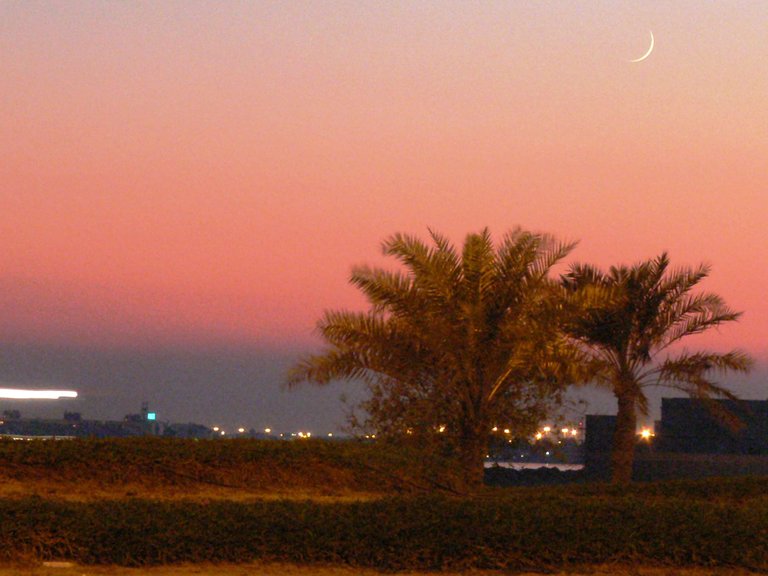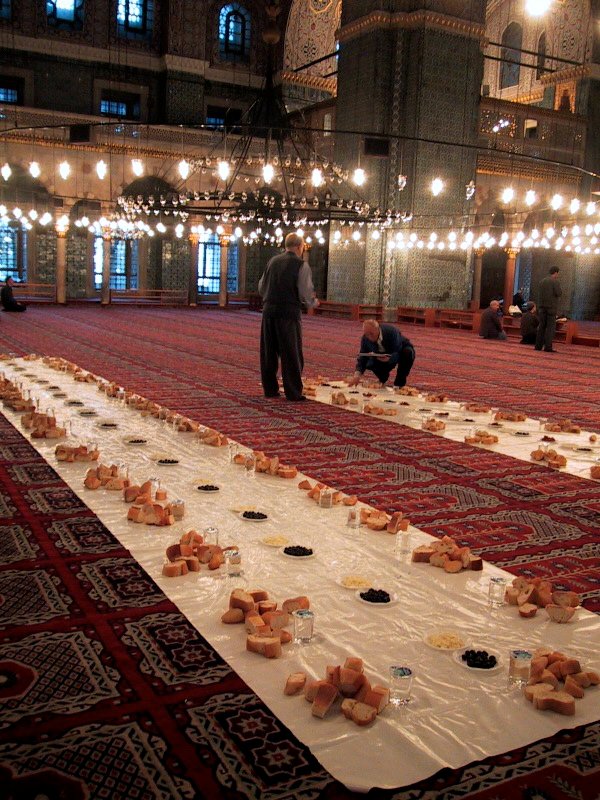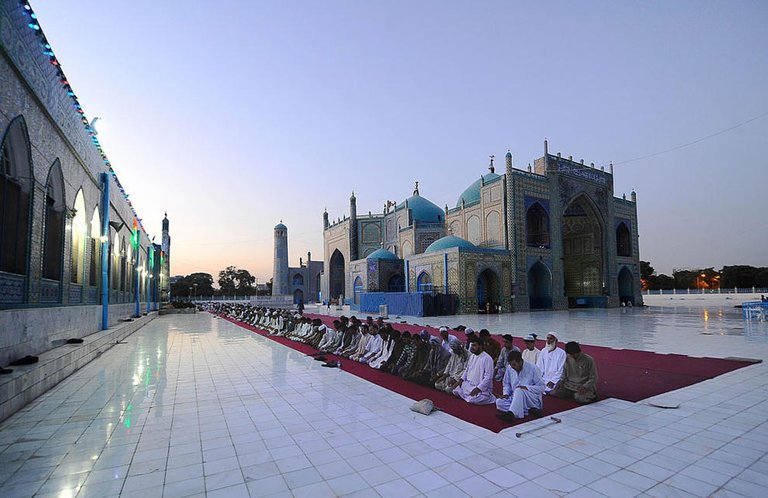Ramadan (Arabic: رمضان) also known as Ramazan, romanized as Ramzan, Ramadhan, or Ramathan) is the ninth month of the Islamic calendar, and is observed by Muslims worldwide as a month of fasting (Sawm) to commemorate the first revelation of the Quran to Muhammad according to Islamic belief. This annual observance is regarded as one of the Five Pillars of Islam. The month lasts 29–30 days based on the visual sightings of the crescent moon, according to numerous biographical accounts compiled in the hadiths.
The word Ramadan comes from the Arabic root ramiḍa or ar-ramaḍ, which means scorching heat or dryness. Fasting is fard (obligatory) for adult Muslims, except those who are suffering from an illness, travelling, are elderly, pregnant, breastfeeding, diabetic, chronically ill or menstruating. Fasting the month of Ramadan was made obligatory (wājib) during the month of Sha'ban, in the second year after the Muslims migrated from Mecca to Medina. Fatwas have been issued declaring that Muslims who live in regions with a natural phenomenon such as the midnight sun or polar night should follow the timetable of Mecca, but the more commonly accepted opinion is that Muslims in those areas should follow the timetable of the closest country to them in which night can be distinguished from day.
While fasting from dawn until sunset, Muslims refrain from consuming food, drinking liquids, smoking, and engaging in sexual relations. Muslims are also instructed to refrain from sinful behavior that may negate the reward of fasting, such as false speech (insulting, backbiting, cursing, lying, etc.) and fighting except in self-defense. Pre-fast meals before dawn are referred to as Suhoor, while the post-fast breaking feasts after sunset are called Iftar. Spiritual rewards (thawab) for fasting are also believed to be multiplied within the month of Ramadan. Fasting for Muslims during Ramadan typically includes the increased offering of salat (prayers), recitation of the Quran and an increase of doing good deeds and charity.

A crescent moon can be seen over palm trees at Manama, marking the beginning of the Islamic month of Ramadan in Bahrain.
HISTORY :: The month of Ramadan is that in which was revealed the Quran; a guidance for mankind, and clear proofs of the guidance, and the criterion (of right and wrong). And whosoever of you is present, let him fast the month, and whosoever of you is sick or on a journey, a number of other days. Allah desires for you ease; He desires not hardship for you; and that you should complete the period, and that you should magnify Allah for having guided you, and that perhaps you may be thankful.[Quran 2:185]
It is believed that the Quran was first revealed to Muhammad during the month of Ramadan which has been referred to as the "best of times". The first revelation was sent down on Laylat al-Qadr (The night of Power) which is one of the five odd nights of the last ten days of Ramadan. According to hadith, all holy scriptures were sent down during Ramadan. It is further believed that the tablets of Ibrahim, the Torah, the Psalms, the Gospel and the Quran were sent down on 1st, 6th, 12th, 13th[note 2] and 24th Ramadan respectively.
According to the Quran, fasting was also obligatory for prior nations, and is a way to attain taqwa, fear of God.[Quran 2:183] God proclaimed to Muhammad that fasting for His sake was not a new innovation in monotheism, but rather an obligation practiced by those truly devoted to the oneness of God. The pagans of Mecca also fasted, but only on tenth day of Muharram to expiate sins and avoid droughts.
The ruling to observe fasting during Ramadan was sent down 18 months after Hijra, during the month of Sha'ban in the second year of Hijra in 624 CE.
Abu Zanad, an Arabic writer from Iraq who lived after the founding of Islam, in around 747 CE, wrote that at least one Mandaean community located in al-Jazira (modern northern Iraq) observed Ramadan before converting to Islam.[not in citation given]
According to historian Philip Jenkins, Ramadan comes "from the strict Lenten discipline of the Syrian Churches", a postulation corroborated by other scholars, such as the theologian Paul-Gordon Chandler. This suggestion is based on the Orientalist idea that the Quran itself has Syriac Christian origins, a claim to which some Muslim academics such as M. Al-Azami, object.
FASTING :: Ramadan is a time of spiritual reflection, improvement and increased devotion and worship. Muslims are expected to put more effort into following the teachings of Islam. The fast (sawm) begins at dawn and ends at sunset. In addition to abstaining from eating and drinking, Muslims also increase restraint, such as abstaining from sexual relations and generally sinful speech and behavior. The act of fasting is said to redirect the heart away from worldly activities, its purpose being to cleanse the soul by freeing it from harmful impurities. Ramadan also teaches Muslims how to better practice self-discipline, self-control, sacrifice, and empathy for those who are less fortunate; thus encouraging actions of generosity and compulsory charity (zakat).
It becomes compulsory for Muslims to start fasting when they reach puberty, so long as they are healthy and sane, and have no disabilities or illnesses. Many children endeavour to complete as many fasts as possible as practice for later life.
Exemptions to fasting are travel, menstruation, severe illness, pregnancy, and breastfeeding. However, many Muslims with medical conditions insist on fasting to satisfy their spiritual needs, although it is not recommended by the hadith. Professionals should closely monitor such individuals who decide to persist with fasting. Those who were unable to fast still must make up the days missed later.
IFTAR :: At sunset, families hasten for the fast-breaking meal known as iftar. Dates are usually the first food to break the fast; according to tradition, Muhammad broke fast with three dates. Following that, Muslims generally adjourn for the Maghrib prayer, the fourth of the five daily prayers, after which the main meal is served.

This Is Iftar At Sultan Ahmed Mosque In Istanbul, Turkey.

Men praying during Ramadan at the Shrine of Ali or "Blue Mosque" in Mazar-i-Sharif, Afghanistan.
Hi! I am a robot. I just upvoted you! I found similar content that readers might be interested in:
https://en.wikipedia.org/wiki/Ramadan